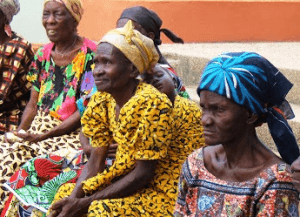COVID-19 has worsened self-isolation of older persons
 Professor Charles Mate-Kole, the Director, Centre for Ageing Studies, University of Ghana, says the outbreak of COVID-19 in Ghana has worsened the social isolation of older adults and threatened their health status.
Professor Charles Mate-Kole, the Director, Centre for Ageing Studies, University of Ghana, says the outbreak of COVID-19 in Ghana has worsened the social isolation of older adults and threatened their health status.
He said perceptions toward older adults in the country had become infused with negative attitudes and ageism was prevalent, especially against the frail female older adult who was single, poor, uneducated, and experiencing some cognitive impairment.
He said with the rapid growth of older persons in Africa and Ghana, it had become necessary to pay attention to studies related to ageing.
According to reports by United Nations (2017) and WHO (2018), Ghana had an estimated older adult population (thus 60 years and above) of 7.1 per cent in 2015, an increase from 4.5 per cent in 1960, he said, adding that the proportion was projected to rise to 9.8 per cent (about five million) by 2050, he said.
Prof. Mate-Kole said recent studies among older adults in Ghana, reported a high prevalence of chronic medical conditions such as hypertension, diabetes, arthritis, and cataract along with substantial prevalence of geriatric-specific conditions such as falls and mobility disorders, urinary incontinence, and cognitive impairment.
There is increasing isolation and neglect of older adults as a result of migration of the youth from rural areas to seek better jobs in urban centres and abroad, he said.
The Director said until recently, there were no centres or institutions aimed at ageing studies in Ghana or the sub-region.
The Centre for Ageing Studies (CFAS) at the University of Ghana is the first of its kind in the sub-region, comprising an interdisciplinary group of faculties with teaching and research interest on issues related to ageing and the aged.
The Centre aims at providing resource for healthy ageing, conducting cutting-edge research and providing training in ageing studies, he explained in a statement he signed and copied to the Ghana New Agency in Accra.
Prof. Mate-Kole gave the advice when the Centre commemorated the 30th Anniversary United Nations International Day of Older Persons (UNIDOP) on Thursday October 1, 2020, in partnership with the Samuel Amo Tobbin Foundation, after bringing together stakeholders including; academics/researchers, health professionals, caregivers, social workers, religious institutions, governmental/non-governmental institutions and older persons in the Ghanaian society to discuss and implement national strategies and action plans on ageing.
The commemoration was on the theme: “Pandemics: Do They Change How We Address Age and Ageing?
He said the Centre was also collaborating with the Ghana College of Physicians and Surgeons in the training of medical doctors in the specialty of Geriatric Medicine.
“As we celebrate another milestone in recognition of our older adults, the Centre wishes to recommend the following: The youth in our society should pay more careful attention to older adults and provide them with the social, material, and spiritual support to the best of their abilities, recognising that someday they will also become old,” he advised.
Professor Mate-Kole also encouraged older adults to strictly adhere to the WHO/Ghana Health Service protocols and directives to fight the disease and asked caregivers at individual homes and in institutionalised adult nursing homes to exercise strict infection prevention protocols in providing care.
Churches and religious organisations, he said, had to find innovative ways to meet the spiritual and psychosocial needs of their older adults who had been excluded from congregational worship.
“Finally, CFAS adds its voice to the voices of other stakeholders to strongly appeal to our Government and our Parliament to pay urgent attention to the Aged Persons’ Bill and pass it into law.
“The law will provide the overarching guidelines to the holistic care of the older population. The major political parties have made promises regarding the aged in their manifestos. The Centre and indeed, all stakeholders therefore look forward to the manifestation of these promises,” he said.
Source: GNA
